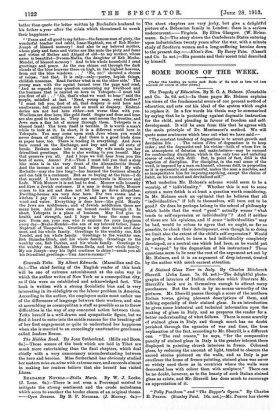SOME BOOKS OF THE WEEK.
[Under This heading we notice such Books of the week as hare not keen reserced for reticle in other forms.]
The Tragedy of Education. By E. G. A. Holmes. (Constable and Co. 2s. 6d. net.)—In these pages Mr. Holmes explains
his views of the fundamental errors of our present method of education, and sets out his ideal of the system which ought to replace it. In a few words his thesis may be summarized by saying that he is protesting against dogmatic instruction for the child, and pleading in favour of freedom and self- development. It will be seen from this that he agrees with the main principle of Dr. Montessori's method. We will quote some sentences which bear out what we have said:—
" The constant tendency of dogmatism is to arrest growth and devitalize life. . . . The raison d'être of dogmatism is to keep order ; and the dogmatist and his victim—both of whom live in an atmosphere of delusion and make-believe—may be excused for confounding discipline, which is the only true and unfailing source of order, with drill. But, in point of fact, drill is the negation of discipline. For discipline, in the real sense of the word, is imposed by a man on himself, whereas drill, in proportion as it is systematic and successful, makes the man a machine, and so incapacitates him for imposing anything, except the chains of habit, on his numbed and devitalized self."
What underlies Mr. Holmes's scheme would seem to be a worship of " individuality." Whether this is not to some extent a mere fetish is at least a question worth considering. Is Mr. Holmes such an optimist that he believes that all " individualities," if left to themselves, will turn out to be
good P Or does be perhaps belong to the school of philosophy
which holds that the word " good " actually means "what tends to self-expression or individuality " ? And if neither of these are his opinions, and if some "individualities" may be bad, would he refuse to agree that we ought, so far as possible, to check their development, even though in so doing we limit also the extent of the child's self-expression? Would he prefer, in short, to have a bad individuality completely
developed, or a neutral one which bad been, as he would put it, " warped" by the dogmatism of his instructors ? These questions seem to lie near the root of the argument set out by Mr. Holmes, and it is an argument of deep interest, treated by the author with much earnest attention.


























































 Previous page
Previous page